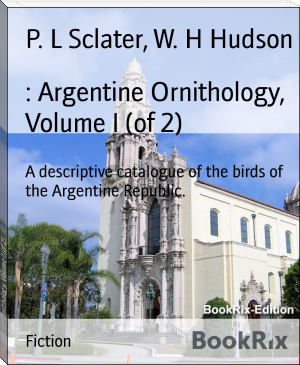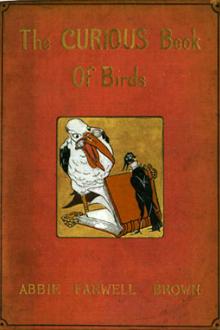: Argentine Ornithology, Volume I (of 2), P. L Sclater, W. H Hudson [best authors to read txt] 📗

- Author: P. L Sclater, W. H Hudson
Book online «: Argentine Ornithology, Volume I (of 2), P. L Sclater, W. H Hudson [best authors to read txt] 📗». Author P. L Sclater, W. H Hudson
+Poospiza nigrorufa+, _Burm. La-Plata Reise_, ii. p. 484 (Paraná);
_Scl. et Salv. Nomencl._ p. 30; _Durnford, Ibis_, 1877, p. 171
(Buenos Ayres); _Döring, Exp. al Rio Negro, Zool._ p. 38 (Rio
Sauce); _Barrows, Bull. Nutt. Orn. Cl._ viii. p. 129
(Concepcion).
_Description._--Entire upper parts black, faintly washed with olive;
superciliary stripe pale straw-colour; two outer tail-feathers
on each side tipped with white; throat and under surface bright
chestnut; centre of abdomen white; under tail-coverts pale buff:
total length 5·8 inches, wing 2·5, tail 2·2. _Female_: upper parts
not so dark as in male; underparts light buff, mottled and striped
with blackish.
_Hab._ South Brazil, Paraguay, and Argentina.
This sweet-voiced little songster appears in Buenos Ayres at the end
of September; it is a common bird in grounds abounding in bushes and
scattered trees, and, in its bright ruddy breast and dark upper
plumage, has some resemblance to the English Robin; only it has a very
conspicuous straw-coloured line above the eye. Its voice also, in purity
and sweetness of tone, is not unlike that of the Robin; but the
song, composed of six unvarying notes, is uttered in a deliberate,
business-like manner at regular intervals, and is monotonous. Never more
than two birds are seen together; they feed on the ground in humid
situations, the male frequently seeking a perch to sing. The nest is
made on the round, or in a close bush near the surface; the eggs have a
pale bluish ground-colour, irregularly marked with black and very dark
brown spots, and in some instances clouded with faint grey.
60. POOSPIZA WHITII, Scl. (WHITE'S WARBLING FINCH.)
+Poospiza whitii+, _Scl. P. Z. S._ 1883, p. 43, pl. ix.
_Description._--Above clear grey, very faintly washed with olive;
tail black, the outer feathers on each side tipped with white, as in
_P. erythrophrys_; patch between bill and eye, the anterior half of
superciliary stripe, and chin white; hinder part of superciliary
stripe and under surface chestnut; middle of belly white; under
tail-coverts buff: total length 5·5 inches, wing 2·4, tail 2·6.
_Female_ similar, but breast pale rufous; abdomen white; sides grey
and buff.
_Hab._ Province of Cordova, Rep. Arg.
This species has only been obtained by the late Mr. E. W. White. He met
with specimens of it at Cosquin, Cordova, in June, July, and August,
It has been dedicated to its discoverer, who has so largelyaugmented our knowledge of the Argentine avifauna, and whose premature
death was a veritable loss for science.
61. POOSPIZA ERYTHROPHRYS, Scl. (RED-BROWED WARBLING FINCH.)
+Poospiza erythrophrys+, _Scl. Ibis_, 1881, p. 599, pl. xvii. fig. 1;
_White, P. Z. S._ 1882, p. 599 (Catamarca).
_Description._--Above grey, faintly washed with olive; greater
wing-coverts tipped with white; wing-feathers blackish, edged with
grey; tail blackish grey, the two outer feathers on each side tipped
with white, and on the outer feather the white extending down
the outer web to the base of the tail; superciliary stripe and
whole under surface light chestnut, paler on the abdomen; under
tail-coverts buff: total length 5·5 inches, wing 2·5, tail 2·3.
_Hab._ Northern Argentina.
This pretty species is another of White's discoveries. He first met
with it in the Sierra of Totoral, Catamarca, and subsequently about 20
miles north of Buenos Ayres.
62. POOSPIZA ASSIMILIS, Cab. (RED-FLANKED WARBLING FINCH.)
+Poospiza assimilis+, _Cab. Mus. Hein._ i. p. 137; _White, P. Z. S._
1882, p. 599 (Misiones). +Poospiza lateralis+, _Barrows, Bull.
Nutt. Orn. Cl._ viii. p. 130 (Concepcion).
_Description._--Above grey, slight superciliary mark whitish; middle
of back and wings washed with rufous; rump bright rufous; tail
blackish, two lateral pairs of rectrices broadly tipped with white;
beneath grey, white in the middle of the belly; flanks and crissum
bright rufous; under wing-coverts greyish white; bill horn-colour,
lower mandible yellowish; feet pale brown; whole length 5·0 inches,
wing 2·5, tail 2·4.
_Hab._ Northern Argentina.
White found this species abundant amongst the thick weeds and grass in
the outskirts of Concepcion. He took it for _P. thoracica_, from which
it differs in its rufous rump. It is more like _P. lateralis_.
63. POOSPIZA ORNATA (Landb.). (PRETTY WARBLING FINCH.)
+Phrygilus ornatus+, _Landb. Journ. f. Orn._ 1865, p. 405. +Poospiza
ornata+, _Scl. et Salv. Nomencl._ p. 30.
_Description._--Above grey; back more or less varied with chestnut;
long superciliaries ochreous white; wings blackish, coverts edged
with white, tail black, lateral rectrices broadly tipped with white;
beneath dark chestnut, lighter on the middle of the belly; bill and
feet dark brown; whole length 5·2 inches, wing 2·4, tail 2·3.
_Female_ similar, but paler in colour, especially below.
_Hab._ Mendoza.
64. POOSPIZA TORQUATA (d'Orb. et Lafr.). (RINGED WARBLING FINCH.)
+Poospiza torquata+, _Burm. La-Plata Reise_, ii. p. 484 (Mendoza);
_Scl. et Salv. Nomencl._ p. 30; _White, P. Z. S._ 1882, p. 599
(Santiago del Estero); _Döring, Exp. al Rio Negro, Zool._ p. 38
(R. Colorado).
_Description._--Above grey; wings blackish, the greater wing-coverts
tipped with white; tail-feathers black, the two outer on each side
tipped with white; from the bill, a broad white stripe extends
above the eye to the nape; crown grey; sides of head black; beneath
white, the chest crossed with a broad black band; under tail-coverts
rufous: total length 5·3 inches, wing 2·5, tail 2·3.
_Hab._ Bolivia and Argentina.
White met with a male of this species in September 1881, at San Pedro,
in the province of Santiago. Burmeister found it near Mendoza in the
valleys of Sierra de Uspallata.
65. POOSPIZA MELANOLEUCA (Vieill.). (WHITE-AND-GREY WARBLING FINCH.)
+Poospiza melanoleuca+, _Burm. La-Plata Reise_, ii. p. 484 (Entrerios);
_Scl. et Salv. Nomencl._ p. 30; _Salv. Ibis_, 1880, p. 354, pl.
fig. 2 (Tucuman); _White, P. Z. S._ 1882, p. 599 (Salta);_Barrows, Bull. Nutt. Orn. Cl._ viii. p. 130 (Entrerios).
_Description._--Above, head and neck blackish; back grey; wings and
tail blackish, three outer rectrices on each side tipped with white;
beneath white; sides washed with grey, breast and belly also faintly
tinged with grey: whole length 5·1 inches, wing 2·3, tail 2·0.
_Female_ similar.
_Hab._ Argentina.
White says that in Salta "this bird frequents the gardens in the
vicinity of the houses, where it vigorously pursues the ants amongst the
branches of the trees." Mr. Barrows says that near Concepcion it had the
general motions and appearance of a Titmouse, thus differing widely from
the other members of the genus.
66. PHRYGILUS GAYI (Eyd. et Gerv.). (GAY'S FINCH.)
+Phrygilus gayi+, _Burm. La-Plata Reise_, ii. p. 487 (Mendoza);
_Scl. et Salv.





Comments (0)